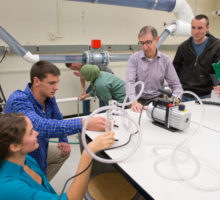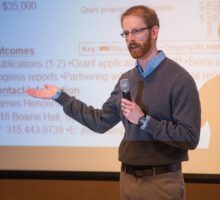It is National Science Foundation (“NSF”) policy to “foster safe and harassment-free environments wherever science is conducted.” (NSF 2023 PAPPG Guide II-E.9]. NSF’s new policy requirement states that there must be a plan for a safe and inclusive work environment created and on file at the proposal stage. PIs are responsible for distributing the plan to each participant in advance of departure for an off-campus research activity. Off-campus or off-site research is defined by NSF for this requirement as “data/information/samples being collected off-campus or off-site, such as fieldwork or research activities on vessels and aircraft.”
Effective as of January 30, 2023, NSF grant applicants, including Syracuse University, are required to certify that we have a plan in place for a safe and inclusive work environment. The plan specifically addresses:
- Abuse of any person, including but not limited to harassment, stalking, bullying or hazing or any kind, whether the behavior is carried out verbally, physically, electronically, or in written form; and
- Conduct that is unwelcome, offensive, indecent, obscene, or disorderly
The creation and distribution of the plan is the responsibility of the award PI. To ease the administrative burden, the Office of Sponsored Programs has created a Plan Template for your use.
- Page 1. of the template plan provides instructions for the PI,
- Page 2. of the plan outlines Syracuse University’s compliance with NSF’s requirement and provides links to all relevant University policies, and
- Page 3. of the plan is the project specific information PIs will prepare and share with OSP prior to proposal submission.
PIs are responsible for distributing a copy of the plan to all required participants (See Participants definition in the FAQ) in advance of departure for an off-campus research activity, as well as maintaining documentation of who received the plan. Unless specifically requested, applicants should not submit the plan to NSF for review.
For additional information and examples of the applicability of the new NSF policy, please see the FAQ, or contact your OSP Research Administrator.





